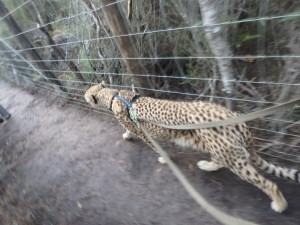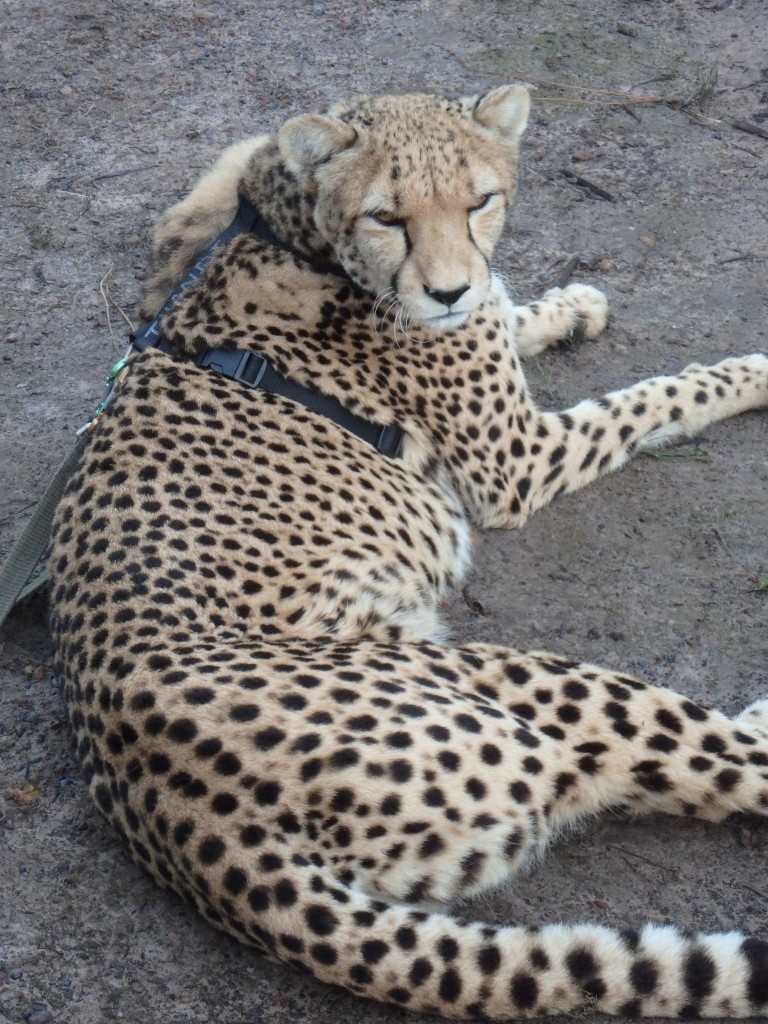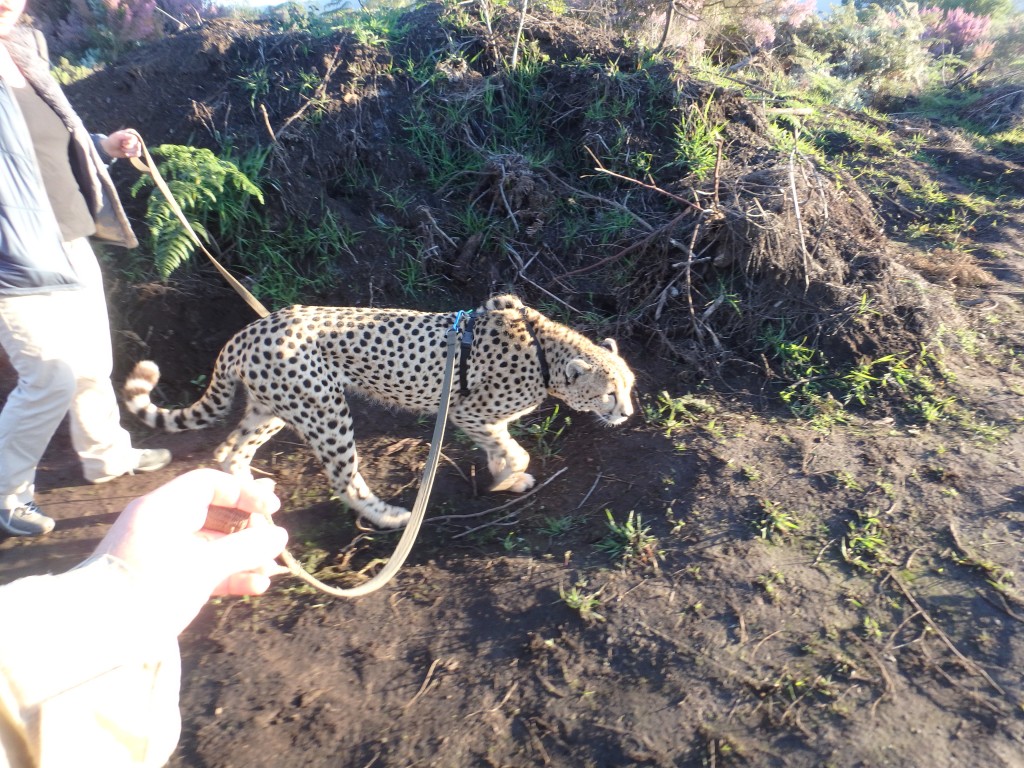June 25th.
Another long, full day of incredible experiences. We arrived at Tanikwa, and after a little waiting but very little to-do (signing an indemnity form releasing them from all responsibility if we get maimed by the animals), we were led to the cheetah enclosure. As we approached it, walking along a long fence, a honey-badger came running at us, snarling and cursing at us for the entire length of its long (eighty feet) enclosure, and then, just as quickly as it had come, it vanished. Our guides, three black men, paid the honey-badgers no attention. They walked past him to a gate, opened it, led us into a small fenced-in area, closed the gate behind us, and then opened another gate, and we walked into the cheetah-enclosure, a wooded area, quite large, enclosing perhaps an acre of ground, with a small pond, a grassy area, and dense thickets of undergrowth. I don’t think I will ever forget that first moment, when, in the dim morning light, as we stood there, two cheetahs emerged from the underbrush and walked right toward us.
I have written before of how most religious disciplines have, as their goal, the reabsorption of our entire being in the present moment, where God dwells: but a very simple way of doing this is to be in the presence of a large, dangerous animal. You have no other thoughts: you are there, watching and attentive, alert and alive. We had no idea how the animals would act.
The cheetahs walked to the gate we had just entered, where our guides put leashes on them, and finally gave us a few safety instructions: we should not crouch down in front of the cheetahs – that makes us look about the right size for a meal – nor stare in their eyes (a potential challenge), and not attempt to corral them with the leashes. If they wanted to go left, we should let them go left; if they wanted to trot, we should trot with them; if they wanted to run, we should just drop the leash and let them run. The cheetahs took very little interest in us; they were looking outside their gate: they wanted to go for their walk. They were not really affectionate with the guides either: they did not seem really tame; they tolerated life with humans, and had adapted to it, but they did not show the love and affection for certain people that dogs and (house) cats do. Their faces had looks of undiluted ferocity.
Out the gate we went and the walk began. Walking them was not like walking a dog: they smelled nothing, but rather peered into the woods and grasses continually, their heads often turned to the right or left as they walked; but even so they walked extremely quickly. Since they set the pace, and we did not check them, it was rather them walking us than us walking them.

Not a great picture, but it shows you the two things you need to know about cheetahs: speed and slenderness.
They were beautiful creatures, but strange: their bodies were amazingly lean and long, very unlike the muscular thickness of lions and leopards; indeed they were rather like leopards crossed with greyhounds, so lean and wasplike were they. In their slenderness, much as in human slenderness, was an inbuilt need for motion: and for them I felt the walk was not an activity, or a game: it was a need, a necessary outlet that drained a vast inner reservoir of desired motion. This was a powerful wild animal, with needs that could not be sated by human society: it felt, on the leash, utterly different from either our half-human pets, the antic dog or lazy housecat. It did not amuse itself by smelling everything, or playing with dumb toys: it wanted to see something it could kill, and it could walk all day, if necessary, to find it.
We walked them for two hours, both in and outside the compound; six people, three couples, had signed up for the walk; three guides walked with us as well, and there were two cheetahs. The sun came up as we walked, and as it rose the animals noticeably stopped to look at it, as if to salute it.
The institution, Tanikwa, is supposedly an animal hospital, though we did not tour the hospital facilities; Catherine suspected it was just a tourist operation, with the animal hospital as a fig-leaf. We did see a few one-armed penguins, saved from becoming shark chow, hopping about in a somewhat sad pool. The institution certainly did provide jobs, as people black, white, and in between all worked there, and the animals seemed happy. I did not doubt that they ran an animal hospital there, as there are plenty of animal lovers in the world, who would dedicate every dollar they could find in the world, to the care of animals.
Many other places in South Africa offer similar facilities, with close-up encounters with semi-tame wild animals. I have heard of another place where you can go hunting with a cheetah, who will walk with you, and run down whatever small game is found. Other places offer close encounters with monkeys, or elephants, or crocodiles, or birds; and there are many private game reserves for people who want to see the wild animals in nearer and more daring ways than allowed in national parks; and there are private hunting reserves as well. I think if I were a kid this would be paradise: the names of these animals are our first words – certainly in the Western languages, and maybe in others as well (do Chinese children learn about lions and giraffes there? I presume so) – and a desire to see these animals, and in some way know them, I think is deep inside of us, and in childhood it is frank and unburied. And I suspect that all this middle ground between wildness and civilization – where cheetahs hunt, but hunt with humans – is actually good for us. But perhaps it is just tourism, serving to degrade the nobility of these wild animals. It seemed to me that the cheetahs, as cats often do, had quite kept their dignity even though they now lived with human food-providers.


Post a Comment